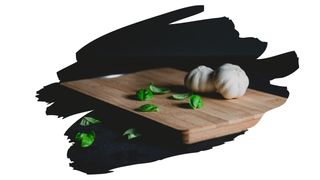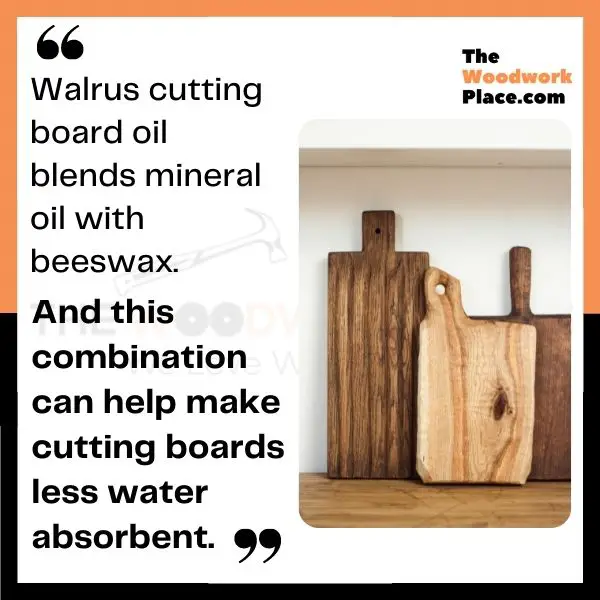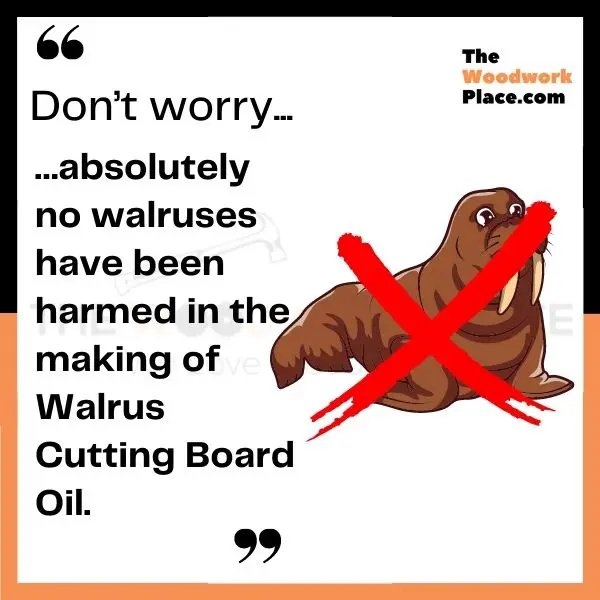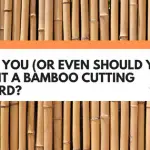If you’ve spent a lot of time crafting your cutting board master piece, you might be wondering how to safely finish it.
Not all wood finishes are food safe, far from it. And while drying oil finishes are non-toxic after they’ve finished curing, that doesn’t mean they can handle the regular heavy chopping of a butcher block.
The last thing you want is a cutting board that has no use in the kitchen. So, what kind of water-repelling finish can you use on a cutting board?
Well, more often than not, the best kind of finish for a cutting board is something called a ‘non-drying oil’ finish. These non-toxic oil finishes will sink right into cutting board timber like any oil finish. However, they do not dry and cure into a hard coat on the surface.
Now, one of the most popular non-drying oil finishes out there is food grade mineral oil. This non-toxic wood finish will soak throughout a cutting board, coating those wood fibers with a water-repellent oil.
And this petroleum distillate sourced oil will help prevent water from being absorbed into those wood fibers, and prevent your cutting board from warping.
So, if mineral oil is already so good at protecting butcher blocks and the like, why is there so much interest in Walrus Oil’s Cutting Board Oil product?
When we compare Walrus Oil vs Mineral oil, there doesn’t appear to be too much that separates them. Walrus oil is made from a blend of mineral oil, beeswax, and coconut oil ingredients.
And, just like Mineral oil, this unique oil-blend will penetrate cutting board wood grain, and protect it from water-damage (just like any non-drying oil finish).
Which begs the question… is it worth paying extra for Walrus oil at all?
Well, in this post, we cover exactly why Walrus oil’s special added ingredients help make cutting boards and butcher blocks much more water-resistant.
We also dive into what mineral oil you should actually be using for your cutting board (hint: not all mineral oil products are food safe).

This post may contain affiliate links to products that we receive a commission for (at no additional cost to you). Learn more here.
What Is In Mineral Oil?
Mineral oil is made 100% from naturally sourced petroleum (or to be more precise, petroleum distillate). And this stuff is used for an amazingly wide range of products.
You can find mineral oil in health care products such as cosmetics, baby oil, and laxatives. You can even find it in use as an industrial grade thermal fluid inside electrical heaters. Which should come as no real surprise, as this clear, tasteless substance is made from refined crude oil.
But, when it comes to wood finishing specifically, we only use food grade mineral oil.
Food grade mineral oil is the non-toxic version of the petroleum product. Which is why it is safe to use on kitchen utensils and food-prep surfaces.
However, most other versions of mineral oil (such as transformer oil), are very toxic. Which is why other versions of mineral oil should be kept well away from your cutting board.
Related Post: Edge Grain vs Face Grain Cutting Boards (Which Is Which?)
What Can You Use Mineral Oil For?
When it comes to food grade mineral oil, you can safely use this oil to finish any wooden food prep surface.
So you can coat this over cutting boards, butcher blocks, and wooden spoons. Heck, you can even use it to safely finish wooden children’s toys.

Does Mineral Oil Expire?
You don’t need to worry about mineral oil going off, because this stuff doesn’t degrade (unlike say olive oil).
This is because mineral oil is a petroleum product that doesn’t absorb water. Which means that bacteria can’t grow inside this substance and cause it to go rancid.
Is There Any Real Difference Between Mineral Oil and Food Grade Mineral Oil?
The difference lies in the level of refinement.
When oil is ‘refined’ it’s basically been put through a super-heated process that completely breaks the oil apart – right back down to its hydrocarbons. It then goes through a treatment process that turns it into a different substance (at its basic component level).
Now, food grade mineral oil is very heavily refined and put through an atmospheric distillation process that removes all of its otherwise natural toxicity.
Related Post: Is Acrylic Paint Food Safe Enough For A Cutting Board?
So, What Can I Use Instead Of Food Grade Mineral Oil?
Well, most mineral oil alternatives tend to be products that blend mineral oil with other additives.
For example, mineral oil can be used to oil guitar fretboards. And fretboard oil products are simply mineral oil with lemon drops thrown in for the aroma.
Related Post: What’s The Best Type Of Oil For An Ebony Fretboard? (Revealed!)
But, when it comes to cutting boards, one of the best blends comes in the form of ‘Walrus Cutting Board Oil’.

What Is Walrus Oil Made Of?
This oil product is made from a mix of non-drying oils. Specifically; coconut oil, beeswax, and of course, mineral oil (with some Vitamin E thrown in for good measure).
In short; there is no actual ‘walrus’ by-product in this finish at all. Walrus oil is simply it’s name (not the name of its main ingredient!).
Now, this non-drying oil is more than just coconut scented mineral oil. Thanks to that beeswax ingredient, it coats on a little like a wood butter.
What Is Wood Butter? Wood butter is a popular wood finish recipe that mixes 4 parts mineral oil with 1 part beeswax. The end result is a finish that’s a little more water-repellent than just mineral oil alone.
Here’s the thing; beeswax doesn’t make mineral oil itself more water-resistant. It’s hardly as though mineral oil needs any more help in that regard.
Instead, beeswax makes wood less water absorbent by sealing exposed wood pores in a way that mineral oil alone simply cannot.
And this is where Walrus Oil comes into its own as a cutting board oil.
What Does Walrus Oil Do?
Walrus oil not only penetrates wood grain, it can also help seal and plug exposed wood pores too.
This extra sealing action won’t be as durable as a drying oil resin, (so you will still need to reapply this oil regularly). However, it will do more for wood than simply relying on just a penetrating oil to get the job done.
And this reason alone is worth the extra cost of buying Walrus Oil (over Mineral Oil) for your cutting board.
You can check out the latest prices for Walrus Oil over on Amazon.com right here.
Does Walrus Oil Go Rancid? Although Walrus oil contains coconut oil, (and coconut oil can go rancid), Walrus oil itself does not go off or decay.
To Sum Up, Here Are The Key 3 Takeaways:
- Mineral oil is the gold-standard as an oil for cutting boards and butcher blocks.
- However, Walrus cutting board oil blends mineral oil with beeswax. And this combination can help make cutting boards less water absorbent.
- And, don’t worry, absolutely no walruses have been harmed in the making of this product. 🙂
References:
Mineral oils (petroleum), severely refined [MAK Value Documentation, 2018]



